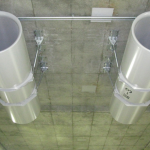The tariffs imposed by the US on China have reignited tensions that have long shaken the stability of international trade. Since the first term of former President Donald Trump, the United States has adopted an increasingly protectionist stance regarding Chinese products. In 2025, this scenario intensified once again with the announcement of new and stricter tariff measures on billions of dollars in Chinese imports. The main argument from the White House is that the tariffs imposed by the US on China are necessary to curb unfair trade practices and protect strategic sectors of the American economy. However, experts warn that this escalation could have significant side effects not only for the two powers but also for markets in both developing and developed countries.
The most recent decision raised the tariffs imposed by the US on China to as much as 125% on certain products, directly impacting sectors such as technology, steel, automobiles, and electronics. Washington justifies this by claiming that China continues to artificially subsidize its exports, undermining fair competition and threatening industrial jobs in the United States. Many political analysts believe that the tariffs imposed by the US on China also have strong electoral motivations, as economic protectionism tends to please a significant portion of the American electorate, especially in industrial states. Even so, the negative effects of this policy may fall on consumers and companies that rely on Chinese inputs and products.
In direct response, the Chinese government quickly retaliated. China’s increase in tariffs on American products sent a clear signal that the Asian nation does not intend to bow easily to Washington’s pressure. China imposed its own trade barriers on strategic items such as soybeans, corn, semiconductors, and industrial machinery, increasing costs for American companies and disrupting entire production chains. This type of retaliation reinforces that the tariffs imposed by the US on China are not merely trade measures but actions that deeply affect diplomatic relations, influence global alliances, and could even trigger a new cold trade war if not managed carefully.
With the tariffs imposed by the US on China now in effect, the economic impact extends far beyond the two countries. Multinational companies operating between the United States and China face constant uncertainty, logistical changes, and rising production costs. This hostile environment discourages investment, hinders technological innovation, and may affect long-term global economic growth. Countries that rely on trade between the two giants are also feeling the consequences, particularly across Asia, Africa, and Latin America. The tariffs imposed by the US on China thus create a ripple effect that impacts interconnected industries and makes the global economic outlook more unstable.
One of the most concerning aspects of the tariffs imposed by the US on China is the rise in the cost of living for the average person. With increased taxes on imported products, essential items like smartphones, computers, auto parts, and appliances are becoming more expensive for American consumers. This contributes to inflation and affects low- and middle-income families the most. The same situation is occurring in China, where retaliatory measures are impacting access to grains, technology, and medical equipment. In other words, contrary to the official narrative of economic protection, the tariffs imposed by the US on China are directly affecting citizens and worsening economic inequality.
Despite all the negative impacts, the US government insists that the tariffs imposed by the US on China are an essential pressure tool to rebalance bilateral trade. US authorities argue that China needs to review practices such as intellectual property theft, international product dumping, and state subsidies. However, critics claim that the tariffs imposed by the US on China have so far produced more diplomatic strain than concrete negotiation advances. Previous trade deals have not yielded the expected results, and in practice, the mutual dependency between the two economies remains strong, which makes resolving the conflict even more complicated.
There is also a geopolitical aspect when discussing the tariffs imposed by the US on China. This tariff policy is part of a broader plan to contain China’s global expansion, especially in technology and trade influence across other continents. The dispute goes far beyond commerce and extends to strategic issues such as dominance in the Pacific, the semiconductor race, and even the role of the Chinese currency in international markets. Thus, the tariffs imposed by the US on China are only the tip of the iceberg in a much broader dispute, where control over trade and technological innovation becomes a matter of global power between the two largest economies in the world.
Ultimately, the continuation and outcome of the tariffs imposed by the US on China will depend directly on the positions adopted by both governments in the coming months. There is internal pressure in the United States, both from the private sector and Congress, to review this policy due to its negative consequences. On the Chinese side, the challenge is to maintain economic growth without yielding to foreign pressure while preserving social and political stability. Until a consensus is reached, the tariffs imposed by the US on China will remain one of the main sources of international tension. It remains to be seen whether this conflict will be resolved through diplomacy or whether it will continue to fuel a dispute with long-lasting consequences for the entire world.
Author: Bergezin Vuc







